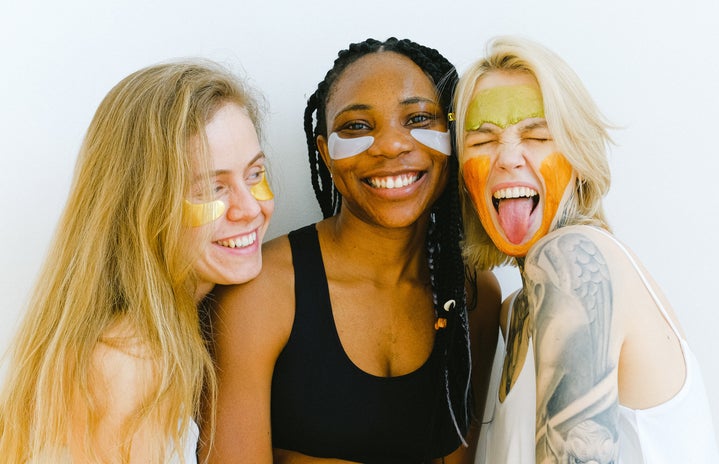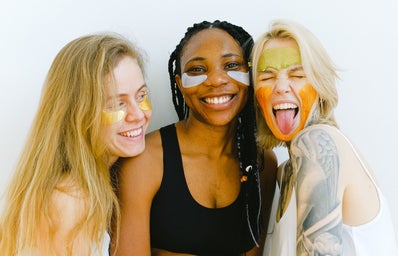It’s easy to fall into the deep and daunting hole of skincare. Over the past decade, skincare has morphed from an often unnoticed topic into a hotly contested and essential beauty step. The remarkable rise of the overarching self-care industry has catapulted this movement forward. Through fancy product lines to obsessed ingredients lists, a new wave of skin information is flooding the internet channels, and this is both a benefit and detriment to viewers.
In recent years, a multitude of skincare trends, hacks, and products have gained tremendous popularity, thanks to social media platforms such as YouTube and TikTok. Much of this uptick in skincare attention is due to social media ‘skinfluencers,’ who have quickly cashed in on society’s obsession with beauty and facial vanity. These self-proclaimed media personalities specialize in skin products and reviews, and have surmounted millions of followers.
Young ‘skinfluencers’ like Hyram (@skincarebyhyram) and Bauer Beauty (@bauerbeauty) are self-identifying ‘skin-care specialists’ who have exploded across the internet via YouTube and TikTok with product reviews and reaction videos. Viral content like theirs has been noted as a ‘god-send’ to teenagers and adults with troubled skin, as well as those who just wish to find their anti-aging glow. Their skincare hyper-focused ingredient analysis has sparked both enlightenment and controversy.
One great benefit to the growing skincare phenomenon is the emphasis on caring for one’s skin. As the largest organ in the body, the dermis (skin) is arguably the most important facet of personal health and beauty. What is put into the body will inevitably show through one’s skin. Acknowledging this is a great first step for healthy-skinned generations to come.
However, while a greater understanding of products and ingredient usage is a benefit, an immense underbelly of misinformation lay under the surface. Those that claim to be skin specialists, enthusiasts, or even estheticians create a precarious and somewhat dangerous ground for audiences. While these videos can be helpful anecdotes, when followers watch blindly and follow steps and advice from those that are not qualified doctors or dermatologists, significant and serious problems can occur. Not every product or method works for all audiences, and the consequences of assuming so are significant. From minor reactions to third-degree burns, ingredient obsessive trends are not as fun and harmless as they might seem.
Hundreds of subsequent ‘skinfluencers’ have risen––who are often as young as high schoolers––and are throwing their own opinions into the convoluted mix. Young followers are extremely susceptible to such internet trends and advice, as they are more likely to have acne and are eager to try any methods available.
Even certified dermatologists have hopped onto the skincare bandwagon, with content creators like Dr. Shah (@dermdoctor) and Dr. Dray (@drdrayzday) posting their own reaction and informative videos. What differentiates these social media personalities from other so-called ‘specialists’ is their legitimate expertise and educational degrees, as they can accurately gauge ingredients and trends from a medical standpoint. Many of these social media derms have entered the beauty community platform to curb misinformation from unqualified influencers, and they additionally post disclaimers that make clear their advice is not intended for diagnosis, treatment, or medical advice, although it seems followers tend to disregard this statement entirely.
Nevertheless, the sensationalization of skin care and active ingredient treatments has become a major facet of the beauty community for better or for worse.
Due to the increased attention on skin products, companies have been forced to update and address concerns with new and advanced product lines, which often include new ingredient trends. Many companies have even partnered with ‘skinfluencers’ on product collaborations as further consumer enticement.
Although knowledge and product advancements are a step in the right direction, the culture of skincare is still often a cesspool of misinformation, overpriced production, and hyper-fixated ingredient ‘cures’. The truth is, there is no miracle to perfect skin, no matter how popular or viral a product or method may be. Dissolving this ‘quick-fix’ illusion is essential for creating a more realistic and safe skin environment for all of us (and our wallets). Further, complete dependency and naive trust in social media influencers and internet information advice is an increasingly unhealthy habit in our digital age.
While skincare can be trendy, our skin should not be. Medical professionals are the most qualified and only appropriate sources for serious skin conditions. Do not blindly trust advice from a specialist, esthetician, or beauty guru without first consulting your doctor. Research and think critically about trends and beauty methods before compromising your face. Gradually stepping back from the pull of the skincare internet hole is difficult, but also necessary. Please seek out a board-certified dermatologist to address your concerns, and take your favorite ‘skinfluencers’ with a grain of salt.



